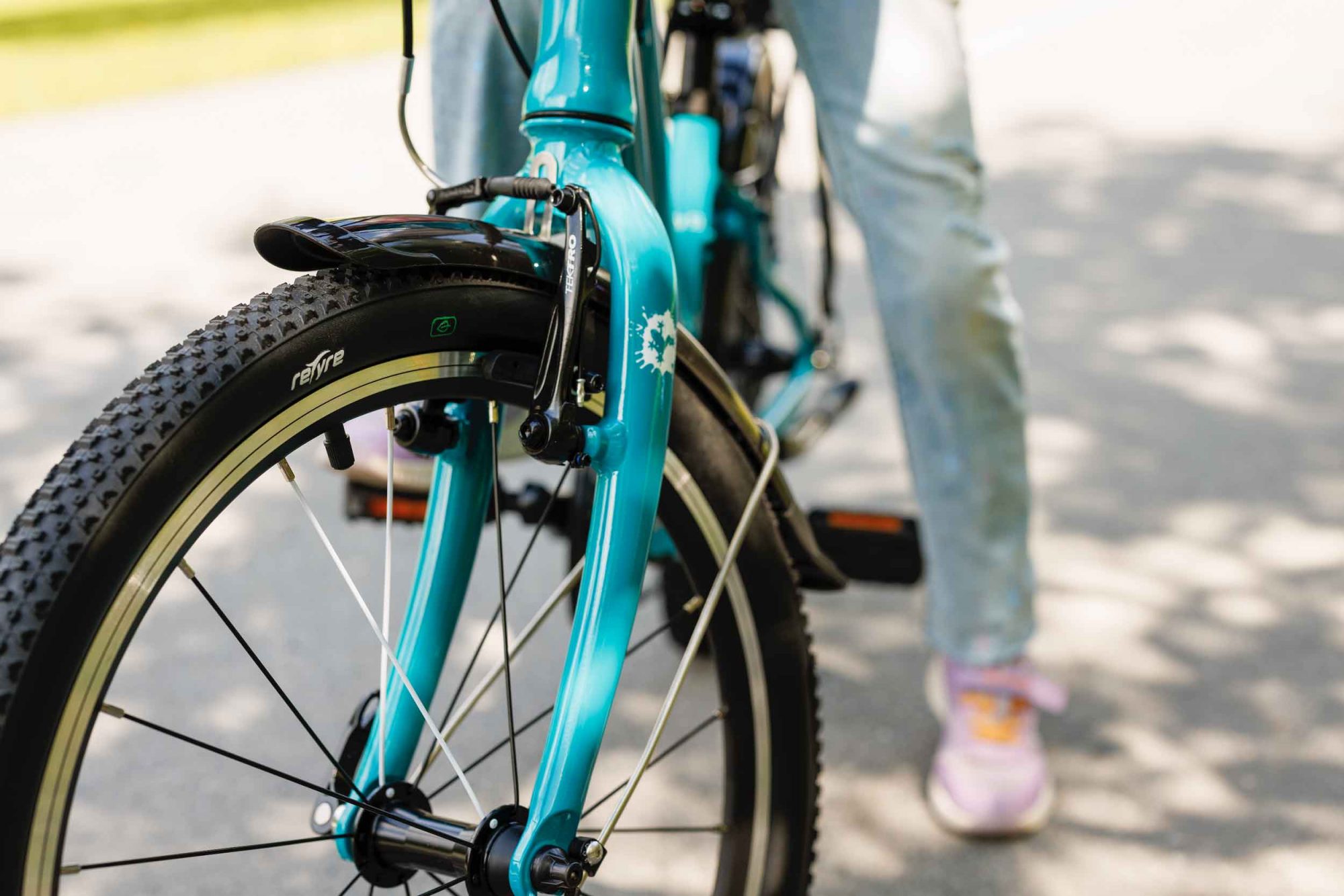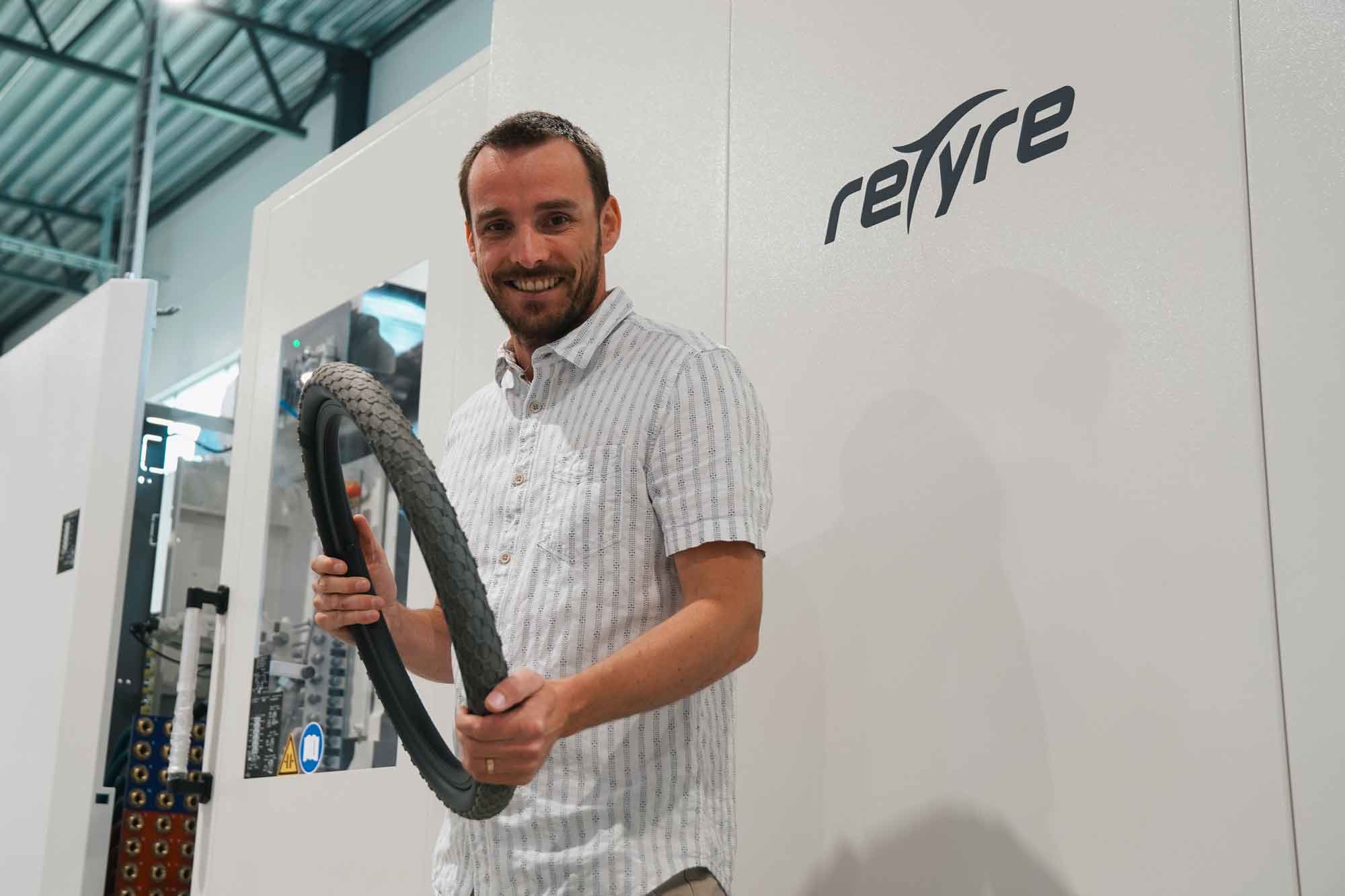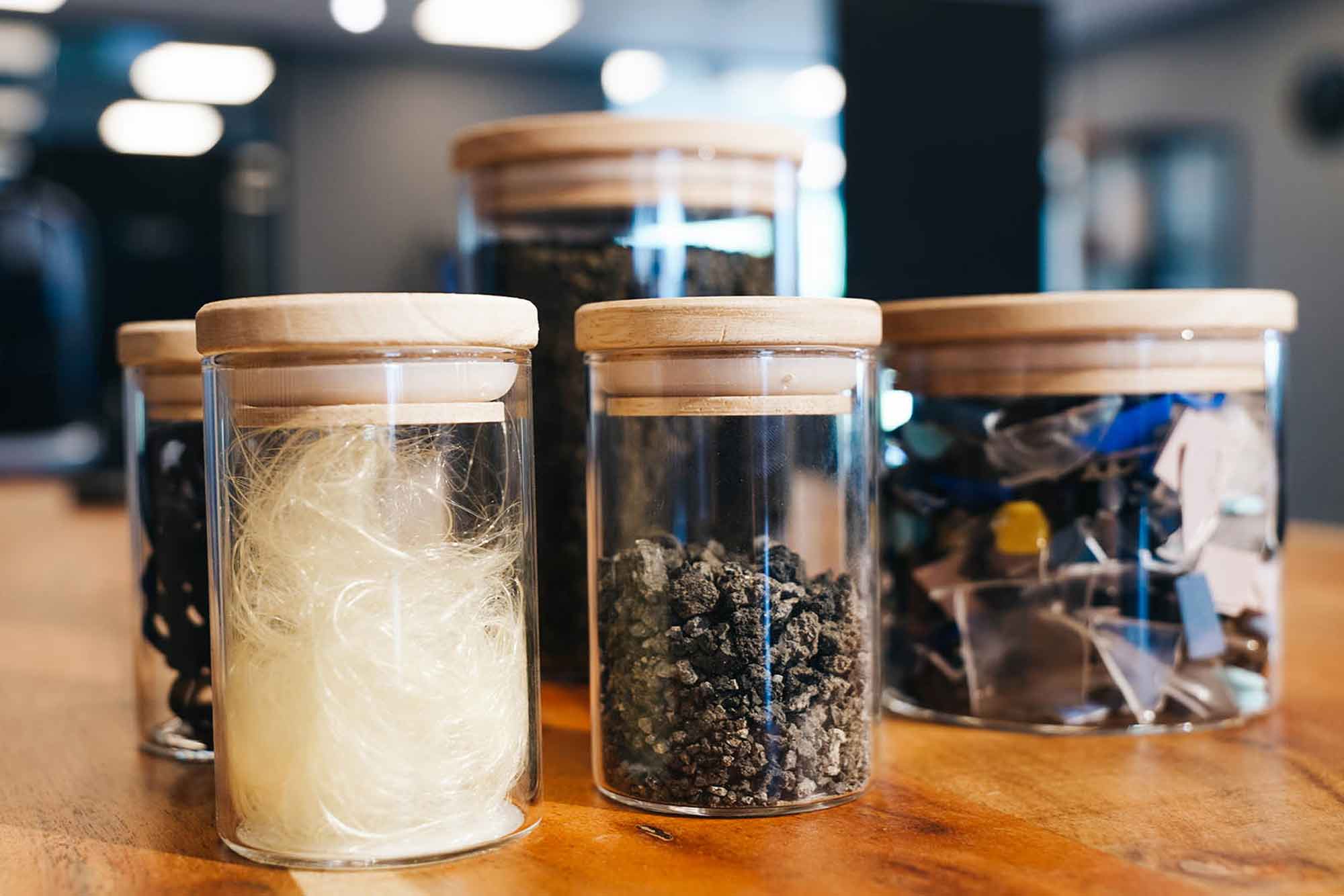Content
A revolution in tire manufacturing?
A sustainable bicycle tire? To produce it, reTyre relies on a combination of innovative materials. The running surface consists of algae obtained from algae blooms. These help to restore aquatic ecosystems and prevent methane release. Recycled para-aramid from old protective vests is used for the tread and puncture protection. In addition, “post-consumer recyclate” (PCR) from local waste streams is used, which is particularly low in CO2. The casing is made from recycled fishing nets, which should reduce emissions by 49% and energy consumption by 15%. Does that sound like a revolution? We would say: absolutely!
The path to CO2 neutrality
Friedemann Ohse, Head of the Carbon-Neutral Tyre Project at reTyre, explains the extensive process: “The carbon footprint of this tire is based on our verified life cycle analysis, including end-of-life, as with all our products. Our production and transport processes are optimized to be virtually emission-free. The end-of-life is reduced to almost zero by recycling the tires. The algae used in the tire has a negative CO2 equivalent and offsets the remaining emissions, achieving a net zero balance. In this way, we have a carbon-neutral product without using any of the well-known shortcuts such as carbon quotas, subsidies or other non-product related contributions.”

Global cooperation and responsible procurement
reTyre works closely with suppliers worldwide to source materials sustainably. Supported by the UN Ecosystem Restoration Program, algae are harvested from lakes and oceans. This not only helps to reduce CO2, but also promotes the health of ecosystems.
Fully sustainable tires
In addition to the revolutionary CO2-neutral tire, reTyre will also be presenting the new City Range at Eurobike. These tires for urban use offer bio-based and sustainable materials, such as plant-based, recyclable elastomers. New treads provide improved performance and grip, while ensuring full performance without compromising on quality. The carbon footprint is minimized over the entire life cycle and all reTyre tires are designed to be 100% recyclable.
Conclusion
reTyre claims to be setting new standards for sustainable bicycle tires with its CO2-neutral tire. That sounds pretty promising to us – and yet, as always, we are a little skeptical. That’s why we caught up with Friedemann Ohse from reTyre and asked him a few more questions. Here is our interview with him.
Interview with Friedemann Ohse, head of the carbon-neutral tire project at reTyre

lifeCYCLE: Hi Friedemann. Please introduce yourself briefly. Who are you, where are you from, what do you do at Retyre?
Friedemann: I’m Friedemann Ohse, designer at reTyre and was currently project manager for the world’s first CO2-neutral tire. Originally from northern Germany, I have been living and working in Norway since 2021, just around the corner at reTyre.
lifeCYCLE: Please tell us briefly about the product that made retyre famous worldwide – a tire system with interchangeable treads with a zipper.
Friedemann: reTyre is actually older and has successful products in over 30 countries. We have won prizes such as the Red Dot Design Award and passed tests such as the ADAC test for winter bicycle tires. The most successful product is our modular tire system, where you have a base tire for the road and then a tread can be attached to it, depending on the terrain or season. High-quality zippers are attached to both the base tire and the so-called skin. Although many people are sceptical at first, we have thousands of fans and changing to studded winter tires is particularly popular here in the north. You see our blue reflective stripes quite often here.
lifeCYCLE: Sustainability was already a major focus during the development of these tires, right? Can you briefly explain the most important facts about this?
Friedemann: You save a lot of different tire sets and changes. With the skin, the material savings are around 40 %. The most important factor, however, is that people use bicycles much more frequently (instead of a combustion engine) in the muddy off-season or in winter. We can now change the tires ourselves in under a minute.
lifeCYCLE: Who is behind Retyre? How long has the company existed? Where does Retyre come from? What is the mission?
Friedemann: The company was founded in Trondheim by a group of resourceful engineers who still run the company today. Our inventor and managing director Paul Magne Amundsen is the visionary mind behind this. I never asked him if he was related to the Norwegian polar explorer Roald Amundsen, but the spirit of exploration and the courage go in the same direction. On the road to modular bicycle tires, the team came up with the idea of how tires could be produced in a completely different way than before – fully automated, without water (steam), without chemicals and using machines that already exist, for example from injection molding.
In the next step, this enables the use of completely different materials, such as bio-based elastomers, which are 100% recyclable. Unfortunately, the majority of tires today end up in landfills or are incinerated during cement production. That’s better! In this respect, we started with the sustainable tires from 2021 to 2022 and (unfortunately) left the zippers behind. We already have customers in all vehicle segments, such as bicycle trailers, bicycles for children and adults, and even wheelbarrow wheels. If everything continues to work so well, we will be looking for partners from the automotive industry. So our ambitions are really considerable, but that’s what it takes if you want to stay on this earth longer than the dinosaurs.

lifeCYCLE: Do you have any personal impressions of the company for us? You emigrated to Norway and came to Retyre almost by chance. There must be a few differences to Germany, right?
Friedemann: Yes exactly, I came to Norway because my wife found a job and I wanted to support her in her career. It is also an experience and an adventure. Once you have a chance like this, you shouldn’t say no. I looked around and found a job advertisement in the same town that sounded very exciting. At the time, I didn’t even know about the company’s world-changing plans.
I was never permanently employed in Germany, but was self-employed for about 14 years. In this respect, I can’t compare so well. However, I hardly felt any difference when I changed from being self-employed to my current job.
Above all, it’s the family feeling and the respect for private life that I really appreciate. What I also like is the light-hearted approach to tasks. On the other hand, we in Germany should not stand in our own way so much and finally get started. Germany has industry, technology and young talent. We have a fantastic understanding of strategy and processes, we need to use that more and not talk so much. I have also realized that Norwegians are often more efficient than Germans, but we are extremely productive. The mix of both nations is therefore excellent – you can see this in joint projects between the two countries, for example in the energy industry, sustainability or in the software sector. We should continue to approach each other!
lifeCYCLE: Let’s slowly get to the big innovation: a climate-neutral, sustainable bicycle tire…
Friedemann: Our climate-neutral tire, which we developed within two months, shows just how innovative and forward-looking our technology is. It is a concept tire with net-zero emissions. It consists of algae, waste (post-consumer waste), old fishing nets and recycled fibers from protective vests. This is not possible in traditional tire production. For sustainable products, a tree is usually planted somewhere or the light in the boiler room is powered by solar energy.
Not that this is not good, but in the end it has nothing at all to do with the product. Instead, we commissioned a company to help us with a life cycle analysis, verified by a third party and with the entire life cycle of materials up to the end of life in the calculation. The latter is often omitted and only counted up to the point of sale (cradle-to-gate). According to the analysis, our mass-produced tires have up to 82% lower emission values. That is more than a good start.
lifeCYCLE: How good can tires be that are not “classically” made with rubber & co? Can Retyre technology “compete” with tried and tested material in terms of quality?
Friedemann: We have set up our own test center for this purpose and work with well-known companies that specialize in tire testing. Thermoplastic elastomers, for example, have great properties and our first generation of tires is already more durable than conventional models. This is also the feedback from our customers, who put our tires through their paces themselves. The many years of experience we have gained with the zipper tires are now paying off.
lifeCYCLE: How well can conventional tires currently be recycled and is there still a lot of room for improvement?
Friedemann: Humanity has a tire problem. Microplastics in the sea also include tire abrasion, with a share of up to 28%. There are currently a good four billion tires in landfills worldwide. So there is still plenty of room for improvement. The recycling of conventional tires is still in its infancy. However, there have been many good advances in both the bicycle and car industries recently. This should also be further supported politically!
lifeCYCLE: What we haven’t even talked about yet are inner tubes. What about sustainability?
Friedemann: We are currently looking after tires. Tubes are relatively easy to recycle because the material is not such a complex mixture. We are currently presenting our new city bike tires – all of which come with puncture protection.
lifeCYCLE: Where do you see reTyre in the future? Do you want to be an alternative or revolutionize the tire market?
Friedemann: Revolutionizing the tire market.
lifeCYCLE: That sounds like a plan! Good luck with it and thank you for your time.